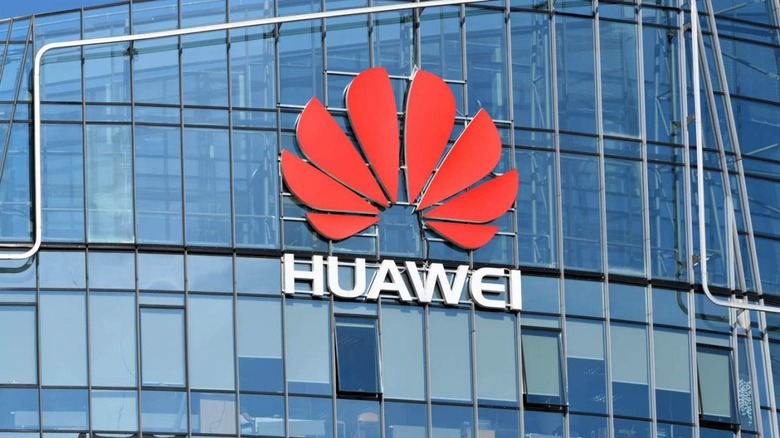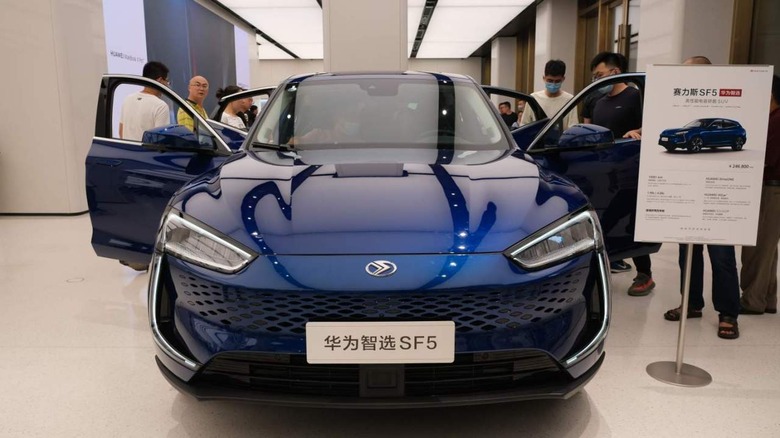The Real Reason America Banned Huawei Phones
Huawei's revenue took a 29% hit in 2021 (via The Wall Street Journal), with the company blaming U.S. sanctions for its woes. Once the world's number one smartphone maker, the company has been reeling as a result of bans from the US and its allies. As recently as July 2020, Huawei was the top smartphone maker in the world, according to CNBC. Even then, however, most analysts knew it could not sustain that position, as sanctions were already taking their toll.
Many consumers wondered why the U.S. had banned Huawei, let alone pressured its allies to follow suit. The company offered a wide range of popular phones, from low-end to flagship models. Many of the company's devices featured sleek, modern designs, and Huawei was also a leader in 5G technology. Additionally, the company has a loyal fanbase that would be the envy of many companies. Despite these factors, the reason the U.S. banned Huawei has everything to do with China.
Allegations of spying
All companies based in China are legally required to support Beijing and render assistance to the government, The Guardian explains. This includes providing information on individuals, customers, and companies, whenever asked.
In spite of that situation, Huawei was seen as having closer ties to the Chinese military and intelligence organizations than most other companies. Much of this is due to its founder, Ren Zhengfei, having served in the People's Liberation Army in China, a background that helped the new company land various contracts (via Android Authority).
Huawei has also faced multiple accusations of stealing other companies' IPs, one such example being the case Cisco filed in 2003. Huawei's problems worsened when Donald Trump campaigned on the promise of "getting tough on China," as CNBC noted. Once elected, Trump led a crackdown on Huawei as part of a larger trade war between the two countries.
As part of the crackdown, U.S. officials revealed some of what they knew about Huawei, in particular its reputation for being an extension of Beijing's spying apparatus. U.S. officials disclosed findings that Huawei had used backdoors in networking equipment it manufactured, backdoors that are normally reserved for law enforcement (via The Wall Street Journal). Other countries also disclosed similar allegations of abuse. For example, ABC News reported that Sweden banned Huawei from any role in its 5G networks, going so far as to blame China and accuse it of cyber espionage.
The Entity List
As part of the U.S. crackdown on Huawei, Reuters reported in March 2021, that the company was placed on the Entity List and Foreign Direct Product Rule, commonly called the "Entity List," which prohibits US companies from doing business with it. As a result, Huawei was blocked from being able to include Google's software and services with its Android phones (via Google).
Similarly, TSMC was blocked from being able to supply semiconductors to Huawei, crippling the company's ability to build new phones, as Nikkei Asian Review reported. Despite TSMC being a Taiwanese company, the Entity List can also prevent any company from providing tech to Huawei that is based on US technology. TSMC falls into that category.
As a result of the U.S. ban, as well as similar actions worldwide, Huawei has taken a number of steps to survive. The company has migrated to HarmonyOS, a fork of the Android operating system. Huawei is also pivoting to other industries, such as cloud computing (via The Financial Times) and electric vehicles (via Reuters). Huawei sees these industries as more insulated and protected from possible sanctions.
According to Reuters, Ren Zhengfei is similarly calling on the company to focus more on software, rather than hardware, saying it's "outside of U.S. control and we will have greater independence and autonomy." In the meantime, US customers will be unable to buy Huawei gear for the foreseeable future, and, if the accusations of spying are true, that's probably for the best.


